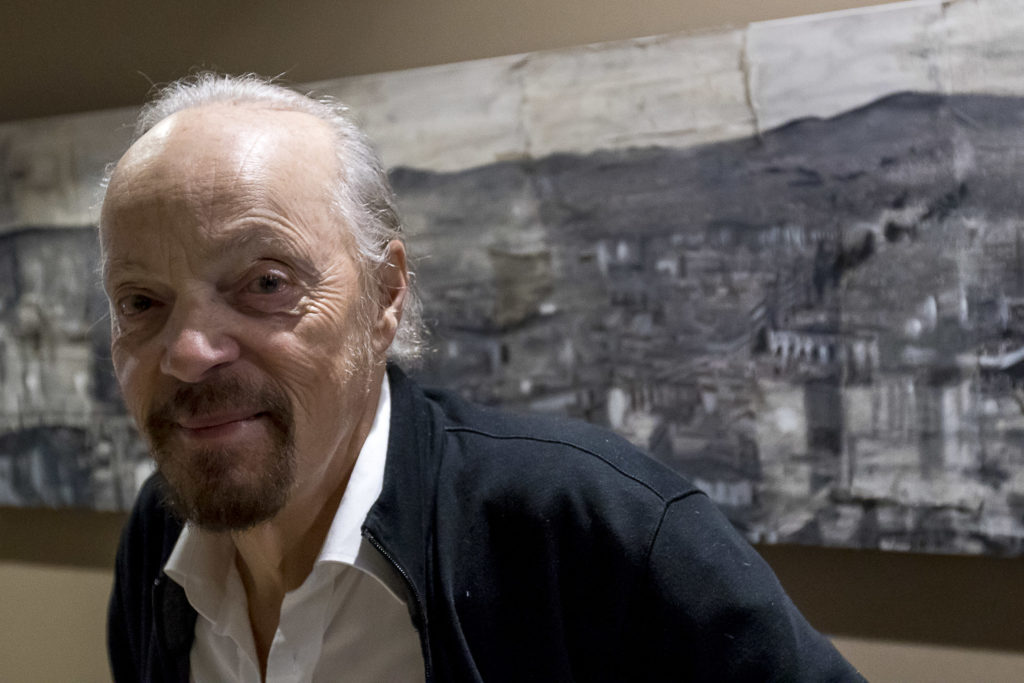07.01.2019 - 10:51
|
Actualització: 07.01.2019 - 11:51
Someone visiting the spectacular Museum of Brittany in Rennes for the first the time would be surprised by the fact that one of the first display cases doesn’t contain a painting, a sculpture or prehistoric remains. Instead there is a record, an artefact. Specifically, it’s an LP record of Alan Stivell’s Un dewezh ‘barzh ‘gêr, a real musical gem. The fact that the museum gives the album such a prominent position is an explicit recognition of the fundamental part the artist has played in his country’s national reconstruction.
After five decades of appearing on stage all round the world, Stivell is one of the great heroes of folk music, while also being a legend for those interested in New Age and techno music, since he has never stopped experimenting with musical genres. In reviving the Celtic harp, Stivell has worked closely with Breton, Scottish, Welsh, Irish and Galician musicians in the search for a common identity confined to the far side of Europe. A geographic extreme, which Stivell nevertheless turns on its head when he declares that Brittany is the centre of the known (and the unknown) universe. Stivell performed in Barcelona this New Year’s Eve, as a guest of the Galician musician Carlos Núñez, in a concert at Barcelona’s Palau de la Música.
—On your new album you’ve sung in Catalan for the first time.
—I’ve always shown my solidarity with other minorities, but in this case, I think that I also wanted to show that I keep abreast of current events.
—Is what’s going on in Catalonia important for the Bretons?
—Of course! What goes on in Catalonia and in Corsica and in Scotland. It all matters to us a lot.
—Did you ever think you’d be having to speak about political prisoners and exiles in 2018?
—It’s truly shocking that there are political prisoners, it makes the European Union very fragile. The existence of Catalonia’s political prisoners represents the suicide of the idea of Europe. How can the European Union ask anything of Turkey, for example, while this is going on?
—What do you think the process of Catalan independence means for Europeans as a whole?
—In Brittany, Yann Fouéré spoke of the Europe of a hundred flags, which is an aspiration shared by many. Europe must allow its peoples to live in freedom. And in this sense, what happens here foreshadows what might happen in other parts of Europe.
—But Europe’s having a bit of a hard time right now…
—That’s right. It’s even going backwards. This is the problem with Brexit, which we Bretons see as the denial of the right of families to stay together.
—In what way?
—It separates us from our Scottish and Welsh brothers and sisters… Up until now, the European Union allowed us to unite what London and Paris wished to separate.
—You see being a Breton as a mixture of identities.
—That’s right. I have French citizenship, but culturally I’m a Celt and I share my space with the Scots, the Irish and the Galicians. There’s such a thing as a citizen identity, but at the same time there’s also a cultural, national identity. My passport says I’m French, but if you ask me what I am, I’d say I’m a Celt.
—What does it mean to be Breton, then?
—We’re nations between borders. The Bretons and the Celts are Westerners, we are the extreme geographical West, but we’re also Eastern, since we’ve been here a long time. We’re a minority, but we’re also the last remaining Gauls. We were here before the Romans arrived on the scene. Our existence ought to be considered a cultural treasure. It turns out that we’re a nuisance because France was built on a denial of its pre-Roman past. As a result, we never manage to fit in.
—Nevertheless, music has revitalized your existence, and you’ve played a big part in that.
—I’ve always enjoyed research. In the Celtic world, there are many people who play folk music beautifully because it’s been handed down through their family. The grandfather played it and now the grandson does. It’s great, but sometimes it’s not enough to find out who we are. Which is why I wanted to look into our music, that of all the Celtic countries, to better understand what we are and what we can be. I’ve done some research, and I’ve looked beyond tradition, I’ve studied a lot in search of originality.
—There’s been something of a Celtic revival…
—Sometimes it hasn’t helped! Some romantics have developed a very unscientific view of the Celtic world, a neo-druid view that’s almost laughable.
—The language, the use of Breton, what part does it play?
—Obviously it’s very important. My mother tongue is French, but I learned Breton, I had to, to do what I wanted to do.
—In fact, for decades, your success has honoured the Breton language.
—I can still remember really well my first concert at the Olympia, in Paris in 1972. In those days, the Bretons were seen as like peasants, people who weren’t of any interest. And suddenly there’s a Breton singing in Breton, mixing Celtic folk with rock in the temple of modern music. It also had a big impact on the language. I once performed live on a top French radio station for an audience of seven million. It must be the largest number of people to have ever heard how the Breton language sounds.
—Does language define one’s world?
—Every language is a world in itself. For example, in Brittany, France is called Bro-C’hall, but the word explicitly refers to the part of France that doesn’t include Brittany and, in fact, etymologically it means ‘the land of foreigners’. Which means it can’t be used to speak of a France that includes the Bretons, since we can’t use the word foreigner to refer to ourselves. That’s why Bro-Frañs was invented. In contrast, there’s no word in French or Spanish to define the nation of the French French or the Spanish Spanish. In the Iberian Peninsula, for example, what is Spanish Spain called, the part where there are no Catalans, Basques or Galicians? They don’t have a unique name for themselves. This creates a world, a way of seeing the world. They can only be understood by including us. Such things obviously have some sort of an effect!
—You’ve been making music for fifty years, but you’re also politically and culturally active. How do you manage to combine the two?
—I’m an activist, but the music has to be good. My political and cultural views are obvious, but if the music’s no good, then the views are worthless. In Catalonia you have some marvellous examples. Lluís Llach is a great activist, but artistically he’s what the French call a top.
—Your new album, Human-Kelt, is a kind of summary of your musical career. You revisit some of your historic songs.
—I’ve had plenty of time to make this album, in the studio. I’ve been able to work hard on it, and it’s been a real pleasure for me.
—How’s it possible that you still find a way to make a new version of ‘Tri Martolod’?
—The public have made this song their own! ‘Tri Martolod’ is a piece based on tradition which has become an anthem of sorts. On this record, I wanted to compress time. I’ve been singing it for so many years, I thought I could make a version out of the different versions. I’ve used very different arrangements in the piece: folk, electro-rock, bagad [a traditional Breton band]…, There’s even my voice from the seventies in the background, clips from the original recording. It’s as if I’d managed to do away with time by making a musical journey through my life! I like to think it’s like one of those journeys made by the Breton sailors and that I’ve been joined by all the musicians who have made the song their own so many times.
—What do you feel when you hear contemporary acts such as Nolwenn Leroy, singing ‘Tri Martolod’ once again to big audiences?
—It’s like listening to the original all over again. It’s like what happened in the seventies: there are people who when they hear it, they get interested in the lyrics, they discover Breton in a very positive, attractive sense. It’s great.
—Speaking of politics again: the struggle for the reunification of Britany, following the division imposed by the French government, might it serve as a trigger for the Breton cause?
—The fight is generating a certain awareness. They wanted to completely erase us and turn us into ‘the great west’, as they used to call us. In the end, Brittany has kept its name, but the region has lost one of its historical provinces and this has raised the awareness of many people.
—For the first time there’s been talk of a referendum on reunification.
—The people must have a voice. The problem is that ultimately Breton politicians depend on the political parties in Paris.
—But, seen from the perspective of your five-decade long career, Brittany’s reality has changed a great deal.
—It’s true. When we started, Bretons had a real inferiority complex, and that’s no longer the case; there’s even a kind of Breton chauvinism…
—Chauvinism, how do you mean?
—That there are many Bretons who have gone from having an inferiority complex to thinking that we live in the best country in the world, that we have the best food, that we have the best countryside, the best music… But a lot of these people still don’t realise what we really are. They couldn’t name any of the Breton kings, for example. They don’t see us as a nationality or as a national minority, but rather as some sort of ‘region with a strong personality’…
—Is that a thing?
—Well, there are people who pitch ‘regions with a strong personality’, such as Britain and Corsica, against ‘regions with a weak personality’, such as Champagne and Burgundy. It’s a feeling, but without any basis in fact.
—Nevertheless, it doesn’t undo all the work that’s been done all these years.
—No, of course not. A lot of progress has been made. A lot.
—And finally. You’ve come to Barcelona to take part in Carlos Núñez’s concert at the Palau de la Música, as his special guest. But when will we be lucky enough to see a whole Alan Stivell concert?
—Oh, I don’t know! For me it’s a bit frustrating. It’s been ten years since I last played here. I’d love to come back.


